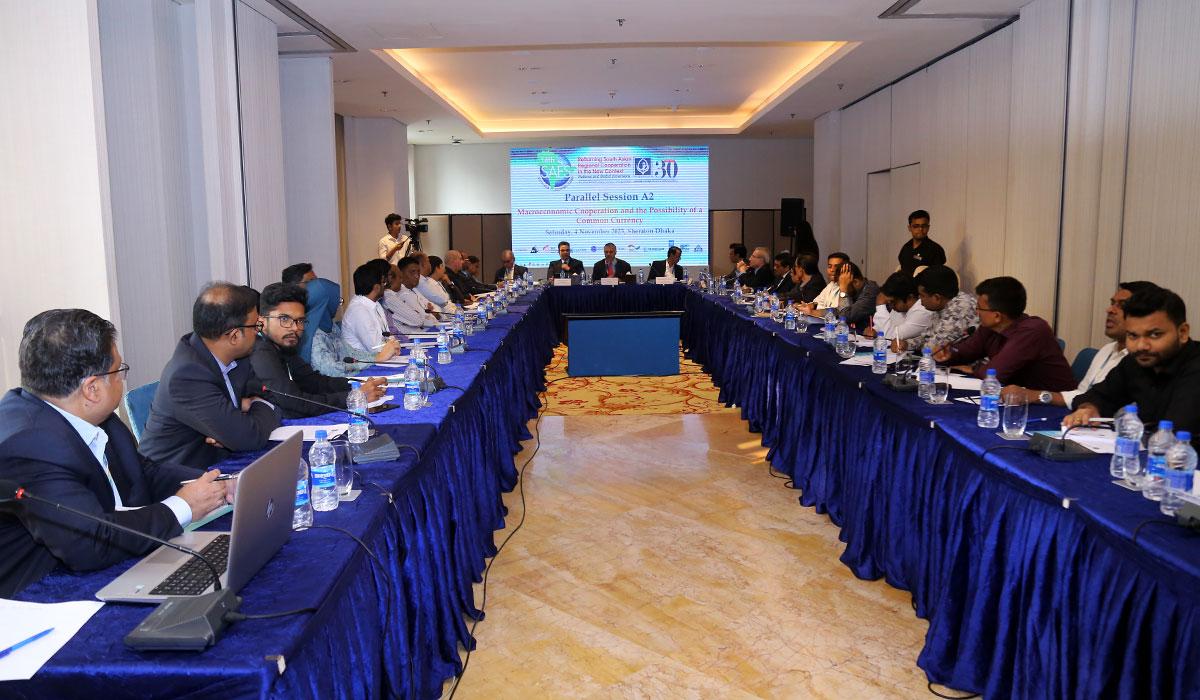
Establishing a common currency in the South Asian region, similar to Europe, could potentially lead to greater economic integration, improved trade facilitation, and enhanced regional cooperation. The currency cooperation is likely to happen if the benefits exceed costs for all parties involved. The possible benefits will be a reduction in transaction costs and exchange rate risk. Conversely, the associated costs could arise from constraints on the macroeconomic policy options available at the individual country level.
Several challenges hinder currency cooperation in South Asia. One significant obstacle is the low level of trade within the region, accounting for only 5 per cent compared to the 25 per cent seen in the Association of Southeast Asian Nations (ASEAN). Barriers to mobility are high, including non-tariff barriers and complex visa policies across all member countries. Bureaucracies in the region are notably inflexible, and concerns about national sovereignty further complicate matters, as national currencies evoke strong emotions and attachment.
To establish currency cooperation, concessions must be made; one cannot have both collaboration and maintain the status quo. Opting for a vehicle currency offers advantages by preserving more policy sovereignty compared to adopting a common currency. Moreover, the economic shocks experienced by these countries are diverse and not always similar, symmetric, or co-variant.
These are some of the insights that emerged at the parallel session A2 of the Fourteenth South Asia Economic Summit (SAES XIV) titled ‘Macroeconomic Cooperation and the Possibility of a Common Currency’ held on 4 November, 2023.
The Chair of the session, Professor Sachin Chaturvedi, Director General, Research and Information System for Developing Countries (RIS), India, underscored ‘With continuous adjustments to interest rates in the US, it is becoming much more challenging for the global south to maintain the necessary currency levels. However, this challenge is being addressed through open market operations’.
In his presentation, Dr Zahid Hussain, Former Lead Economist, The World Bank, Bangladesh opined ‘Currently, I do not think South Asia is suitable for a currency union. But going forward, greater economic integration will increase incentives for monetary cooperation’.
‘South Asian countries have the potential to decrease their reliance on the dollar and mutually support one another in their quest for economic development’ said the Executive Director of Sustainable Development Policy Institute (SDPI), Pakistan, Dr Abid Qaiyum Suleri.
‘The ideal conditions for a common currency are far from what we are experiencing here’ opined Dr Priyadarshi Dash, Associate Professor, Research and Information Centre for Developing Countries (RIS), India.
The Executive Director of Policy Research Institute of Bangladesh (PRI), Dr Ahsan Habib Mansur, underscored, ‘Trade facilitation, investment, people-to-people relations, and policy harmonisation are key factors in achieving regional economic cooperation’.
Dr Md. Habibur Rahman, Chief Economist, Bangladesh Bank, stated that the adoption of a common currency necessitates certain preconditions. These include achieving economic comparability, addressing disparities, and, currently, the South Asian region is not ready for such a move.
The speakers at the session also discussed that fostering cooperation in South Asia demands a comprehensive approach that extends beyond physical connectivity to include digital integration, especially in banking and finance. Clarity regarding the mechanics of cross-border transactions and the permissible types of current account and capital account transactions are essential. Trust, safety, liquidity, settlement facilities, and system integrity are critical components for sound cross-border transactions.
In addition to digital connectivity, harmonising tax policies is indispensable for promoting fairness and combating issues such as profit shifting. This includes measures like customs duty rationalisation and congruent income tax policies. Such harmonisation not only enhances economic collaboration but also ensures that collective efforts are directed towards maintaining fairness and equity in the region.
By addressing these key aspects—digital connectivity in banking and finance, clarity in cross-border transactions, and harmonisation of tax policies—South Asian nations can pave the way for more effective regional cooperation and sustainable economic growth.
High-level policymakers, political leaders, academics, development practitioners, civil society activists from Bangladesh and the South Asian region attended the session and shared their valuable insights.
- Concept Note
- Programme
- Presentations
– Cooperation in Public Health – Rudra Suwal
– Cross-Border Labour Flows in South Asia: An Overview – Raghav Chakravarthy
– Macroeconomic Policy Choices in South Asia: Ideas and Choices – Dr. Priyadarshi Dash
– Role of Knowledge Actors in Advancing a New Political Settlement in South Asia – Sanjib Baruah
– Towards an Integrated Energy Grid – Dr. Shankar Shrestha - Session Guidelines
– Plenary Session 1 | Plenary Session 2 | Plenary Session 3
– Parallel Session A1 | Parallel Session A2 | Parallel Session A3
– Parallel Session B1 | Parallel Session B2 | Parallel Session B3
– Parallel Session C1 | Parallel Session C2 | Parallel Session C3 - Speeches
– Welcome Remarks by Dr Fahmida Khatun
– Speech by Dr. Nandalal Weerasinghe
– Speech by Dr Paras Kharel
– Speech by Dr Yuba Raj Khatiwada
– Conference Summary by Dr Khondaker Golam Moazzem - Webpost
Inaugural Session | Plenary Session 1 | Parallel Session A1 | Parallel Session A2 | Parallel Session A3 | Plenary Session 2 | Plenary Session 3 | Parallel Session B1 | Parallel Session B2 | Parallel Session B3 | Parallel Session C1 |Parallel Session C2 | Parallel Session C3 | Closing Session - Photos of the Conference
Inaugural Session | Plenary Session 1 | Parallel Session A1 | Parallel Session A2 | Parallel Session A3 | Plenary Session 2 | Plenary Session 3 | Parallel Session B1 | Parallel Session B2 | Parallel Session B3 | Parallel Session C1 | Parallel Session C2 | Parallel Session C3 | Closing Session | Cultural Programme - Videos of the Conference
Inaugural Session | Plenary Session 1 | Parallel Session A1 | Parallel Session A2 | Parallel Session A3 | Plenary Session 2 | Plenary Session 3 | Parallel Session B1 | Parallel Session B2 | Parallel Session B3 | Parallel Session C1 | Parallel Session C2 | Parallel Session C3 | Closing Session | Cultural Programme

